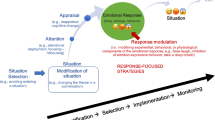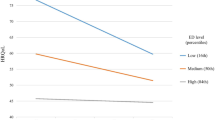Abstract
While symptoms of deficient emotional self-regulation (DESR) such as low frustration tolerance, temper outbursts, emotional impulsivity, and mood lability are commonly associated with attention deficit hyperactivity disorder (ADHD), little is known about their nature. The main aim of this post hoc study was to examine the correlates of DESR in a large sample of adults with and without ADHD. Subjects were 206 adults with ADHD and 123 adults without ADHD from a family study of ADHD. Emotional impulsivity was operationalized using items from the Barkley Current Behavior Scale. Subjects were comprehensively assessed for psychiatric comorbidity using structured diagnostic interview methodology. We used the Quality of Life, Enjoyment, and Satisfaction Questionnaire-Short Form (QLES-Q-SF) and Social Adjustment Scale-Self-report (SAS-SR) to assess quality of life and psychosocial functioning. DESR was more common among ADHD compared with non-ADHD adults, and 55 % of adults with ADHD reported extreme DESR of greater severity than 95 % of control subjects. The association of ADHD and DESR was not entirely accounted for by either current or lifetime comorbid disorders. DESR was also associated with significant functional impairment as evaluated by the QLES-Q-SF and SAS-SR, and with reduced marital status, as well as higher risk for traffic accidents and arrests. DESR adversely impacts quality of life in adults with ADHD. More work is needed to further evaluate DESR in clinical and investigational studies of subjects with ADHD.


Similar content being viewed by others
References
American Psychiatric Association (1968) Diagnostic and statistical manual of mental disorders, 2nd edn. American Psychiatric Association, Washington
American Psychiatric Association (1987) Diagnostic and statistical manual of mental disorders. 3rd-Revised ed. American Psychiatric Association, Washington, DC
American Psychiatric Association (2000) Diagnostic and statistical manual of mental disorders, 4th edn. American Psychiatric Association, Washington
Barkley RA (1997a) Behavioral inhibition, sustained attention, and executive functions: constructing a unifying theory of ADHD. Psychol Bull 121:65–94
Barkley R (1997b) ADHD in adults: comorbidity and adaptive impairments. NIMH. pp. Grant number1R01MH054509-01A2
Barkley RA (2006) Attention deficit-hyperactivity disorder: a handbook for diagnosis and treatment, 3rd edn. Guilford Press, New York
Barkley RA, Murphy KR, Fischer M (2008) ADHD in adults: what the science says. Guilford Press, New York
Biederman J, Faraone SV (2005) Attention deficit hyperactivity disorder. Lancet 366:237–248
Brown T (1995) Brown attention deficit disorder scales. The Psychological Corporation, San Antonio
Conners CK, Erhardt D, Sparrow E (1999) Conners’ adult ADHD rating scales (CAARS). Multi-Health Systems, North Tonawanda
Endicott J, Nee J, Harrison W, Blumenthal R (1993) Quality of life enjoyment and satisfaction questionnaire: a new measure. Psychopharmacol Bull 29:321–326
Faraone SV, Biederman J (2005) What is the prevalence of adult ADHD? Results of a population screen of 966 adults. J Atten Disord 9:384–391
Faraone S, Biederman J, Mick E (2006a) The age dependent decline of attention-deficit/hyperactivity disorder: a meta-analysis of follow-up studies. Psychol Med 36:159–165
Faraone SV, Biederman J, Doyle A, Murray K, Petty C, Adamson JJ, Seidman L (2006b) Neuropsychological studies of late onset and subthreshold diagnoses of adult attention-deficit/hyperactivity disorder. Biol Psychiatry 60:1081–1087. doi:10.1016/j.biopsych.2006.03.060
Faraone SV, Biederman J, Spencer TJ, Mick E, Murray K, Petty C, Adamson JJ, Monuteaux MC (2006c) Diagnosing adult attention deficit hyperactivity disorder: are late onset and subthreshold diagnoses valid? Am J Psychiatry 163:1720–1729. doi:10.1176/appi.ajp.163.10.1720; quiz 1859
Faraone SV, Wilens TE, Petty C, Antshel K, Spencer T, Biederman J (2007) Substance use among ADHD adults: implications of late onset and subthreshold diagnoses. Am J Addict 16(Suppl 1):24–32. doi:10.1080/10550490601082767; quiz 33–34
Faraone SV, Kunwar A, Adamson J, Biederman J (2009) Personality traits among ADHD adults: implications of late-onset and subthreshold diagnoses. Psychol Med 39:685–693. doi:10.1017/S0033291708003917
First M, Spitzer R, Gibbon M, Williams J (1997) Diagnostic and statistical manual of mental disorders. American Psychiatric Press, Washington
Gershon ES, Hamovit J, Guroff JJ, Dibble E, Leckman JF, Sceery W, Targum SD, Nurnberger JI Jr, Goldin LR, Bunney WE Jr (1982) A family study of schizoaffective, bipolar I, bipolar II, unipolar, and normal control probands. Arch Gen Psychiatry 39:1157–1167
Kessler RC, Adler L, Barkley R, Biederman J, Conners CK, Demler O, Faraone SV, Greenhill LL, Howes MJ, Secnik K, Spencer T, Ustun TB, Walters EE, Zaslavsky AM (2006) The prevalence and correlates of adult ADHD in the United States: results from the national comorbidity survey replication. Am J Psychiatry 163:716–723
Leckman JF, Sholomskas D, Thompson D, Belanger A, Weissman MM (1982) Best estimate of lifetime psychiatric diagnosis: a methodological study. Arch Gen Psychiatry 39:879–883
Mick E, Spencer T, Faraone SV, Biederman J, Zhang HF (2008) Assessing the validity of the quality of life enjoyment and satisfaction questionnaire short form in adults with ADHD. J Atten Disord 11(4):504–509
Nigg JT (2005) Neuropsychologic theory and findings in attention-deficit/hyperactivity disorder: the state of the field and salient challenges for the coming decade. Biol Psychiatry 57:1424–1435. doi:10.1016/j.biopsych.2004.11.011
Orvaschel H (1994) Schedule for affective disorder and schizophrenia for school-age children epidemiologic version. Nova Southeastern University, Center for Psychological Studies, Ft. Lauderdale
Reimherr FW, Marchant BK, Strong RE, Hedges DW, Adler L, Spencer TJ, West SA, Soni P (2005) Emotional dysregulation in adult ADHD and response to atomoxetine. Biol Psychiatry 58:125–131. doi:10.1016/j.biopsych.2005.04.040
Reimherr FW, Williams ED, Strong RE, Mestas R, Soni P, Marchant BK (2007) A double-blind, placebo-controlled, crossover study of osmotic release oral system methylphenidate in adults with ADHD with assessment of oppositional and emotional dimensions of the disorder. J Clin Psychiatry 68:93–101
Rosler M, Retz W, Fischer R, Ose C, Alm B, Deckert J, Philipsen A, Herpertz S, Ammer R (2010) Twenty-four-week treatment with extended release methylphenidate improves emotional symptoms in adult ADHD. World J Biol Psychiatry 11:709–718. doi:10.3109/15622971003624197
Surman CB, Biederman J, Spencer T, Yorks D, Miller CA, Petty CR, Faraone SV (2011) Deficient emotional self-regulation and adult attention deficit hyperactivity disorder: a family risk analysis. Am J Psychiatry 168:617–623. doi:10.1176/appi.ajp.2010.10081172
Surman CB, Monuteaux MC, Petty CR, Faraone SV, Spencer TJ, Chu NF, Biederman J (2010) Representativeness of participants in a clinical trial for attention-deficit/hyperactivity disorder? Comparison with adults from a large observational study. J Clin Psychiatry 71:1612–1616. doi:10.4088/JCP.09m05344pur
Weissman M (1995) Social adjustment scale
Wender PH (1995) Attention-deficit hyperactivity disorder in adults. Oxford University Press, New York
Acknowledgments
Dr. Surman has received research support from Abbott, Alza, Cephalon, Eli Lilly, the Hilda and Preston Davis Foundation, McNeil, Merck, New River, National Institutes of Health, Organon, Pamlab, Pfizer, Shire, and Takeda; has been a speaker for Janssen-Ortho, McNeil, Novartis, and Shire; and has been a consultant/advisor for McNeil, Nutricia, Shire, Somaxon, and Takeda. Dr. Surman has also received honoraria from Reed Medical Education (a logistics collaborator for the MGH Psychiatry Academy). Commercial entities supporting the MGH Psychiatry Academy are listed on the Academy’s website www.mghcme.org. Dr. Surman receives royalties for books published by Penguin (FAST MINDS: How To Thrive If You Have ADHD (Or Think You Might)) and Springer (A Practical Guide To The Assessment And Management of ADHD in Adults). Dr. Joseph Biederman is currently receiving research support from the following sources: Elminda, Janssen, McNeil, and Shire. In 2012, Dr. Joseph Biederman received an honorarium from the MGH Psychiatry Academy and The Children’s Hospital of Southwest Florida/Lee Memorial Health System for tuition-funded CME courses. In 2011, Dr. Joseph Biederman gave a single unpaid talk for Juste Pharmaceutical Spain, received honoraria from the MGH Psychiatry Academy for a tuition-funded CME course, and received honoraria for presenting at international scientific conference on ADHD. He also received an honorarium from Cambridge University Press for a chapter publication. Dr. Biederman received departmental royalties from a copyrighted rating scale used for ADHD diagnoses, paid by Eli Lilly, Shire and AstraZeneca; these royalties are paid to the Department of Psychiatry at MGH. In 2010, Dr. Joseph Biederman received a speaker’s fee from a single talk given at Fundación Dr.Manuel Camelo A.C. in Monterrey Mexico. Dr. Biederman provided single consultations for Shionogi Pharma Inc. and Cipher Pharmaceuticals Inc.; the honoraria for these consultations were paid to the Department of Psychiatry at the MGH. Dr. Biederman received honoraria from the MGH Psychiatry Academy for a tuition-funded CME course. In previous years, Dr. Joseph Biederman received research support, consultation fees, or speaker’s fees for/from the following additional sources: Abbott, Alza, AstraZeneca, Boston University, Bristol Myers Squibb, Celltech, Cephalon, Eli Lilly and Co., Esai, Fundacion Areces (Spain), Forest, Glaxo, Gliatech, Hastings Center, Janssen, McNeil, Medice Pharmaceuticals (Germany), Merck, MMC Pediatric, NARSAD, NIDA, New River, NICHD, NIMH, Novartis, Noven, Neurosearch, Organon, Otsuka, Pfizer, Pharmacia, Phase V Communications, Physicians Academy, The Prechter Foundation, Quantia Communications, Reed Exhibitions, Shire, the Spanish Child Psychiatry Association, The Stanley Foundation, UCB Pharma Inc., Veritas, and Wyeth. Dr. Thomas Spencer has received research support from, has been a speaker for or on a speaker bureau or has been an Advisor or on an Advisory Board of the following sources: Alcobra, Shire Laboratories, Inc, Eli Lilly & Company, Glaxo-Smith Kline, Janssen Pharmaceutical, McNeil Pharmaceutical, Novartis Pharmaceuticals, Cephalon, Pfizer, the National Institute of Mental Health and the Department of Defense. Dr. Spencer receives research support from Royalties and Licensing fees on copyrighted ADHD scales through MGH Corporate Sponsored Research and Licensing. Dr. Spencer has a US Patent Application pending Provisional Number (61/233,686), through MGH corporate licensing, on a method to prevent stimulant abuse. In the past year, Dr. Faraone received consulting income and/or research support from Shire, Otsuka and Alcobra and research support from the National Institutes of Health (NIH). He is also on the Clinical Advisory Board for Akili Interactive Labs. In previous years, he received consulting fees or was on Advisory Boards or participated in continuing medical education programs sponsored by: Shire, McNeil, Janssen, Novartis, Pfizer and Eli Lilly. Dr. Faraone receives royalties from books published by Guilford Press: Straight Talk About Your Child’s Mental Health and Oxford University Press: Schizophrenia: The Facts. Ms. Carolyn Miller and Ms. Katie McDermott report no competing interests. Shire Pharmaceuticals provided support for this analysis. This work was supported in part by grants to S. V. Faraone from the National Institute of Health (R01MH57934). We are grateful to Dr. Russell Barkley for generously allowing us to use his questionnaire from NIMH Grant 1R01MH054509-01A2.
Author information
Authors and Affiliations
Corresponding author
Rights and permissions
About this article
Cite this article
Surman, C.B.H., Biederman, J., Spencer, T. et al. Understanding deficient emotional self-regulation in adults with attention deficit hyperactivity disorder: a controlled study. ADHD Atten Def Hyp Disord 5, 273–281 (2013). https://doi.org/10.1007/s12402-012-0100-8
Received:
Accepted:
Published:
Issue Date:
DOI: https://doi.org/10.1007/s12402-012-0100-8




